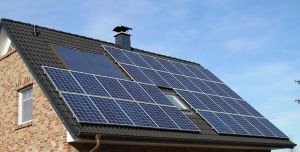 Smaller Power Projects Up 58 Percent
Smaller Power Projects Up 58 Percent
This was the headline for the second item that caught my eye in the December 17, 2014 edition of the Caledonian Record. (The other I commented on here.) According to the article, the majority of these new small power projects, defined as those being able to generate up to 150 kilowatts, have come from solar installations where individuals “take advantage of federal tax credits and the state’s growing affection for cleaner energy sources.” Leaving aside the fact that solar is not “cleaner” if you include all that is necessary to produce the solar panels, one is inclined to wonder just what form the state’s “affection” takes.
In Vermont it is net-metering, a program where utilities are allowed, although given the state’s mandate on renewable energy they might as well be compelled, to buy 4% of their peak load. This limit will increase this year to 15%. So if you are a home owner who has put solar panels on your house, if you generate more electricity than you need, you can sell the excess to the power company, reducing the cost for the energy you will be buying when the sun is not out.
You hear a lot these days that solar power is an economically viable source of energy now with similar costs to at least some fossil fuels so I was a bit surprised to read that power companies are required to pay over market rate for the energy they buy from these small projects. Currently the companies pay $0.20 per kilowatt while the average rate that the power companies sell the electricity in Vermont, as of September 2014, is just $0.143 per kilowatt. So power companies are required to pay more than 30% more than the market price for electricity from solar and other “renewable” sources. The difference is made up through a combination of higher rates for everyone and subsidies from the state. This hardly paints a picture of an economically viable source of energy.
Undoubtedly this, and other state regulations, account for why the average cost of electricity in Vermont is 35% higher than the national average. One can only wonder how much higher Vermont rates will go when the amount of expensive solar power the power companies have to buy increases four fold, and likely more as the mandated renewable energy percentage increases over time.
I am all for alternative means of generating electricity, when it is voluntary and makes sense. For example I know someone who is planning on installing solar panels at his camp as they are all that is needed in that situation and likely more cost effective than paying to have the electric company run the lines out to it. What I oppose is the government deciding for people where their power will come from and what they will pay for it, and forcing some people, those without solar panels or other alternative energy sources, to help pay for the electricity, and property (via the government tax credits for installing solar panels and etc), of those who do.
It would be far better for everyone, rich and poor, individuals and businesses, if the government restricted itself to simply protecting the individual rights of everyone equally and stopped interfering in the economy. This would leave energy producers free to decide what is the best source of energy, which will undoubtedly be less expensive and more reliable than what we have today. It would also leave the individual free to support or not support any plan with no worry that the government might use eminent domain to seize their property in order to provide it to some company, whether it be for a solar array, wind farm or natural gas pipeline.
So when it comes to the government offering incentives and tax breaks to use sources of power that are more expensive and less efficient, especially when at the same time restricting and taxing the abundant and inexpensive sources of energy that we rely on to maintain today’s technological society, I take a page from the book of Ebeneezer Scrooge (who wasn’t quite the bad guy he is portrayed as).
“Bah, humbug!”
humbug: something contrived in order to deceive and mislead.
